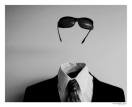CROSSROADS COMMENT --Choose to be visible
Human Rights Day 2006 will take place on Thursday, April 13. Workshops and speakers, dramatic presentations and a student art exhibition, will be presented on the Indiana State University campus at the Hulman Memorial Student Union, 8:30 a.m. - 6:00 p. m. All events are free and open to the public.
* * * * *
Remember when we were kids and liked to play at being invisible? An imagined cloak of invisibility endowed us with safety and power. We probably reasoned along these lines: What cannot be seen cannot be reached, cannot be hurt, cannot be humiliated.
Of course, this was all a kind of comic book reality, but it was our comic book reality and as self-centered children we were ready to live it in a blink.
But safety and power, imagined or real, carry costs not readily evident. Invisibility designed to protect and empower ultimately isolates and enfeebles. Children are not much for calculating such costs-- keeping sophisticated social accounts, weighing trade-offs, contemplating the greater-good. That’s supposed to be the work of adults.
Well, maybe.
Most adults, in order to avoid regimens of drugs and institutionalization, find it a good idea to give up on the fantasy of becoming invisible. However, we still remain amazingly adept at sweeping large portions of the world under a cloak of invisibility most days of our lives. Just think for a few minutes about poverty in our community and in the communities of the world.
Poor people are not invisible and poverty as a condition of life is not inevitable. “Inevitable” being the word many people substitute for “invisible.” Inevitable goes over better in polite conversation. Few people want to have a discussion that includes remarks like: “Well, what can we do? After all, those poor and homeless people are invisible.” Better to frame your views along these lines: “Well, what can we do? There have always been poor and homeless people. It’s inevitable.”
As responsible adults, not children playing at comic book invisibility, how are we to take in and respond in a human way to the statistics on poverty that show up nearly every day in the news?
Here are a few facts linking something most of us know about-- food, with something we choose to make invisible/inevitable--poverty:
25.3 million were fed by America’s Second Harvest, the nation’s largest network of food banks, soup kitchens and shelters, last year. This was a 9 percent increase from 2001. Of these:
--9 million were children,
--nearly 3 million 65 or older,
--41 percent said they have had to choose between buying food or paying for utilities,
–nearly 30 percent had at least one family member in poor health,
–and nearly 70 percent had incomes below the official poverty level, which is $15,067 for a family of three.
But maybe poverty is invisible/inevitable to so many people only because a blizzard of statistical truths about the poor swirl around us incessantly. Scurrying for rationalizations, we ask: Who can possibly plow through these numerical drifts of misery?
All of those cold harsh numbers seem to freeze the good people of this rich and robust nation, immobilizing thought, action, even seeing. Besides, numbers are abstractions. And right now the TV world in which so many of us choose to live is all about Reality, right? So give people something that is real.
OK. Try thinking and acting and seeing the real in some non-statistical truths attributed to John Scalzi in the press last week:
--being poor is knowing exactly how much everything costs.
–being poor is knowing your kid goes to friends' houses but never has friends over to yours.
--being poor is not enough space for everyone who lives with you.
--being poor is a bathtub you have to empty into the toilet.
--being poor is finding the letter your mom wrote to your dad begging him for the child support.
--being poor is not taking the job because you can't find someone you trust to watch your kids.
--being poor is people surprised to discover you're not actually lazy.
--being poor is deciding that it's all right to base a relationship on shelter
--being poor is thinking $8 an hour is a really good deal.
--being poor is knowing how hard it is to stop being poor.
Are we acting like children when we attempt to render poverty invisible/inevitable?
Many people in Terre Haute clearly see how poverty damages lives and our community. And seeing, they work to help the poor every day. But the poor continue to line the pathways of our lives. They are squarely in front of us. As individuals and a s citizens, as public officials and as employers, most of us choose not to see the poor or the painful realities of poverty. Not seeing is a decision. And not seeing and not acting makes us neither safe nor powerful–it only makes us invisible.
s citizens, as public officials and as employers, most of us choose not to see the poor or the painful realities of poverty. Not seeing is a decision. And not seeing and not acting makes us neither safe nor powerful–it only makes us invisible.


0 Comments:
Post a Comment
<< Home